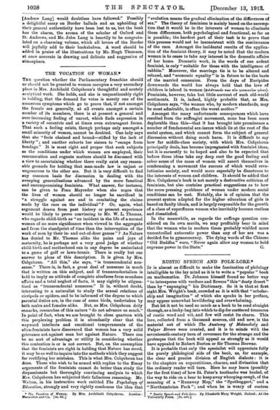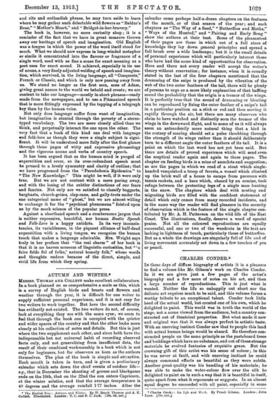RUSTIC SPEECH AND FOLK-LORE.* IT is almost as difficult to
make the fascination of philology intelligible to the lay mind as it is to write a "popular " book on mathematics. Dr. Johnson himself found no better way " to intersperse with verdure and flowers" this" dusty desert " than by " expunging" his Dictionary. So it is that at first sight Mrs. Wright's book, crowded as it is with that " scholar- ship and imagination" of which she speaks in her preface, may appear somewhat bewildering and overwhelming.
But let it not be used so much as a book to be read straight through, as a lucky-bag into which to dip for scattered treasures of rustic word and wit, and few will resist its charm. This lore, collected from a thousand sources, old and new, is the material out of which The Anatomy of Melancholy and Vulgar Errors were created, and it is to minds with the seventeenth-century turn of reverence for the strange and the grotesque that the book will appeal as strongly as it would have appealed to Robert Burton or Sir Thomas Browne.
It is probable that only the specialist will appreciate fully the purely philological side of the book, as, for example, the clear and precise division of English dialects : it is to the chapters on superstitions, charms, and divination that the ordinary reader will turn. Here be may learn (possibly for the first time) of how St. Peter's toothache was healed, of the way to ride on a bear to keep away whooping-cough, of the meaning of a "Runaway Mop," the " Spotboggart," and a. "Northumbrian Peck "; and when he is weary of custom
Rustic Speech and Folk-Lore. By Elizabeth Mary Wright. Oxford: At the University Press. Les. net.]
and rite and outlandish phrase, he may turn aside to learn where he may gather such delectable wild flowers as " Baldur's Brae," "Mother's Heart," and "Bridget-in-her-bravery."
The book is, however, no mere curiosity shop ; it is a reminder of the fact that we have in great measure thrown away our heritage of speech and imagination. Old English was a tongue in which the power of the word itself stood for much. What we should now express in long-winded metaphor or simile it concentrated into the flavour or fragrance of a single word, used with as fine a sense for exact meaning as a poet uses for exact sound. It achieved, especially in its use of nouns, a very finely adjusted welding of speech and imagina- tion, which survived, in the living language, all "Conquests," French or Classic, and which is only now passing away from us. We stand no longer as the first men, sons of Adam, giving great names to the world we behold and create; we are content to take our language—mostly in short phrases—ready made from the newspapers, and to use a Pitmanized speech that is more fittingly expressed by the tapping of a telegraph key than by the human voice.
Not only does language suffer from want of imagination, but imagination is stunted through the poverty of a stereo- typed vocabulary. The two are more closely allied than we think, and perpetually interact the one upon the other. The - very fact that a book of this kind can deal with language and folk-lore as though they were a single subject is signi- ficant. It will be understood more fully after the first glance through these pages of witty and expressive phraseology and the vigorous nouns and verbs of country speech.
It has been argued that as the human mind is purged of superstition and error, so its over-redundant speech must he pruned to a lovely symmetry and clarity of outline; that we have progressed from the "Pseudodoxia Epidemica" to " The New Knowledge." This might be well, if it were only true. But we are not content with a mere paring away, and with the losing of the subtler distinctions of our fears and fancies. Not only are we satisfied to classify boggarts, barghasts, church-grims, clap-cans, and gaily-trots under the one categorical name of "ghost," but we are almost willing to exchange it for the "psychical phenomena" foisted upon us by the mock science of the popular press.
Against a shorthand speech and a cumbersome jargon that is neither expressive, beautiful, nor human Rustic Speech and Folk-Lore is a happy antidote. In its very inconsis- tencies, its variableness, in the piquant alliance of half-dead superstition with a living tongue, we recognize the human touch that makes a language admirable. Mrs. Wright says truly in her preface that "the real charm" of her book is that it is no barren museum of linguistic curiosities, but "'a faire felde ful of folke,' natural homely folk," whose words and thoughts endure because of the direct, simple, and vivid life from which they spring.



























































 Previous page
Previous page